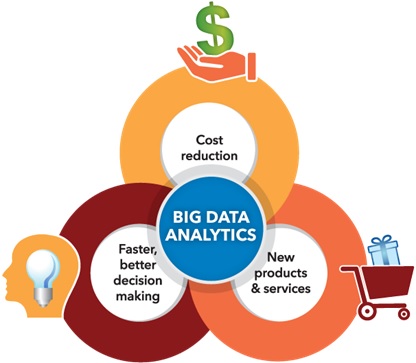Welcome to Ibex Analytics
- +14253899644
- 14121 Tukwila International Blvd, Tukwila WA 98168
- info@ibexanalytics.net
Welcome to Ibex Analytics
Big data analytics is the practice of using sophisticated analytical methods and tools to process and examine vast and complicated information in order to discover patterns, trends, and relationships, particularly those that are not clearly discernible using conventional approaches. Big data analytics may be used in a commercial setting to provide insight throughout the decision-making process, enhance operational efficiency, and gain a competitive advantage by empowering businesses to base their choices on empirical evidence. The following are some applications of frequent corporate uses of big data analytics:
Customer analytics:
Performing data analysis on customers in order to gain insight into their patterns of behavior, preferences, and requirements, as well as to enhance customer satisfaction and loyalty.
Supply chain analytics:
The process of analyzing data from supply chains in order to improve the flow of products and services, save costs, and raise levels of efficiency.
Financial analytics:
Conducting an analysis of financial data with the goals of maximizing financial performance and finding possibilities for both enhanced profitability and decreased costs.
HR analytics:
The process of analyzing data gathered from human resources in order to enhance workforce planning, recruiting, and retention efforts, as well as employee performance and satisfaction.
If you are thinking about using big data analytics in your company, the first step you need to do is to identify the precise business problems you are attempting to address as well as the data sources that are pertinent to those issues. Only then can you go on to the next step. In addition to this, you will need to think about the tools and technologies that you will need in order to process and analyze the data, as well as any training or expertise that may be required.
With the help of big data analytics, organizations can finally take charge of their data and put it to productive use, opening up a world of new opportunities. This leads to better future business choices, more effective operations, more profits, and happier customers. There are a few ways in which businesses that employ big data in conjunction with advanced analytics could see a rise in value.

Fig 1. The Big data analytics in business
Bringing down the costs:
Big data technologies, such cloud-based analytics, might significantly reduce the cost of storing massive amounts of data. Big data analytics also helps companies find more efficient and innovative ways to run their operations.
Making quicker, better judgements:
The speed of in-memory analytics, along with the ability to examine new sources of data like streaming data from the internet of things (IoT), is very beneficial for businesses because it enables them to immediately assess information and make fast decisions based on that analysis.
Creating and distributing brand-new goods and services to customers:
Through the use of analytics, companies may have the ability to provide consumers with exactly what they want, when they want it by understanding their demands and how satisfied they are with their experiences. With the use of big data analytics, more businesses now have the chance to create creative new products to satisfy the ever-evolving requirements of their consumers.
Moreover, big data analytics have a broad variety of applications in the corporate world, such as the management of supply chains, the understanding of consumers’ needs and concerns, the detection of fraudulent transactions, and the identification of operational faults.
Understanding customers
Big data analytics may be used to examine customer data such as demographics, purchasing history, and behavioral patterns to acquire insights into consumers’ preferences and requirements. This can help businesses better understand their customers’ wants and needs. This may help companies better fulfil the demands of their consumers and provide a better experience for those customers by allowing them to more precisely adapt the goods and services they provide.
Identify operational issues
This is done by collecting and analyzing data on these business functions. Businesses are able to optimize their operations and boost their efficiency if they first identify any bottlenecks, inefficiencies, and other difficulties that may exist.
Detect fraudulent transactions
Big data analytics may also be used to detect fraudulent transactions by examining patterns in financial data to find odd or suspicious behavior. This is done via the process of identifying unusual or suspicious patterns. This has the potential to assist companies in avoiding monetary losses and enhancing the safety of their financial systems.
Manages supply chains
Lastly, big data analytics may be used to manage supply chains by evaluating data on the movement of products and services through the supply chain. This data can be gathered through tracking the flow of goods and services through the supply chain. This may assist organizations in reducing costs, optimizing the flow of products, identifying possible interruptions, and taking preventative action.